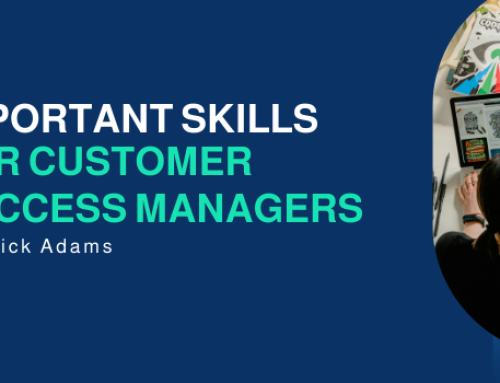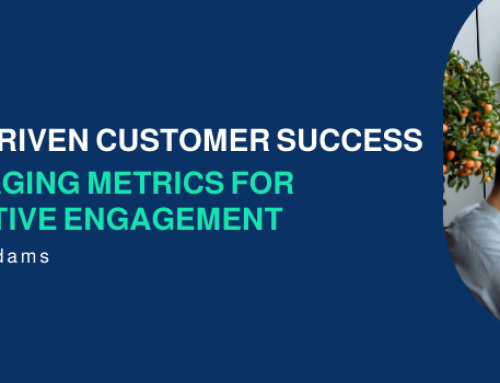Utilizing Data and Technology to support Customer Success Management efforts
The role of data and technology in Customer Success Management
Data in Customer Success Management
Data and technology are essential components of successful business operations, providing the insights and tools needed to manage customer success effectively and any aspect of an organization through evidence-based decision-making. It helps organizations measure performance, identify trends, understand customer needs, and recognize opportunities for growth. For example, data can show what customers want or need so that businesses know which products to make or services to offer. It also helps them figure out if the products or services are working properly, which could be the make-or-break of a Customer Success strategy. How then, can a Customer Success Manager acquire data?
One way a Customer Success Manager can gather data is through customer feedback surveys. Surveys are important for understanding customer satisfaction and can provide insight into how customers view the product or service. Through survey responses, the Customer Success Manager can learn which areas of the product or service have been successful and which may require improvement.
Another way to collect data for Customer Success Management is through usage metrics. A Customer Success Manager can use usage metrics to measure customer engagement with the product or service, understand how customers use certain features, and determine which features are used most often. This information helps the manager determine what parts of the product or service should be developed further and improved upon in order to increase customer satisfaction and loyalty.
Thirdly, a Customer Success Manager can utilize web analytics data to analyze user behaviour on the website or application. Web analytics provide insight into user navigation patterns, where users are clicking most frequently, how long they stay on each page, and any drop-off points in their journey. This data allows the Customer Success Manager to identify areas that need improvement or optimization in order to ensure a better user experience.
Finally, one method of gathering data for Customer Success Management is through competitive analysis. By studying competitors’ products or services as well as their pricing structure and marketing strategies, a Customer Success Manager can gain valuable insights into what works for them and what could work better for their own company’s products or services. Understanding trends in competitor activities also gives the manager an idea of potential new opportunities that could help drive growth within the organization.
Do you want to learn more about the role of data in Customer Success Management? Check out a Coffee Bar Conversation with Rick Adams of Practical CSM and Prithwi Dasgupta of SmartKarrot here.
Technology in Customer Success Management
On the other hand, technology provides the means to access data quickly and accurately so that companies can make informed decisions about their customers. By combining data-driven strategies with a dedicated Customer Success Manager (CSM), businesses can create an environment where customer relationships are managed efficiently and proactively. With these resources in place, companies have an advantage when it comes to maximizing customer satisfaction while minimizing costs.
Technology is integral to a Customer Success Manager’s success. Technology can provide the insights and tools needed to help drive customer engagement, growth, and loyalty. Some of the technology that a Customer Success Manager (CSM) might use include customer relationship management (CRM) software, analytics platforms, customer surveys, and automated communications systems.
CRM software is a tool that helps Customer Success Managers manage customer relationships by tracking customer data such as contact information and sales history. The CRM also enables CSMs to segment customers into different categories based on their preferences or purchase behaviours. This allows them to personalize their outreach efforts by targeting specific customers with relevant messaging that resonates with them.
Analytics platforms are another important tool in a CSM’s arsenal. Using these tools, they can track key performance indicators related to their product or service, such as usage metrics, web analytics data, and competitor insights. These insights provide valuable insight into the effectiveness of current strategies and potential areas for improvement. For example, analyzing web analytics data may reveal areas where users may be dropping off during the purchasing process so that changes can be made in order to improve user experience.
Surveys are another key method used by Customer Success Managers (CSMs). Surveys allow companies to gain direct feedback from customers regarding their satisfaction levels with a product or service they have purchased. Surveys also allow customers to express their opinions freely without feeling pressured, making it easier for companies to identify issues before they become problems or areas where improvements can be made to enhance customer experience.
Finally, automated communications systems are used by many CSMs as well. Automated systems such as email marketing campaigns can be used to send targeted messages at scale in order to boost engagement with customers across different channels and platforms such as websites, social media networks, and mobile apps. Automated messages also enable companies to stay connected with customers even when the Customer Success Manager is not available 24/7 – providing meaningful engagement at all times of day and night!
Summary,
Data and technology can be leveraged to support customer retention and revenue growth by Customer Success Managers in a variety of ways. For example, leveraging CRM software allows CSMs to track customer data such as contact information and sales history, which helps them better understand their customers’ needs and preferences. This knowledge enables them to design personalized outreach efforts that drive engagement and loyalty to help retain customers ultimately.
Utilizing data and technology brings forth numerous benefits in driving retention and revenue growth as it allows CSMs to realize value while ensuring quality customer experience and satisfaction. From segmentation of client groups to identifying churn red flags to automated responses and more, data and technology allow CSMs to handle multiple customers at once and monitor their customer journey – all of which help increase customer engagement while furthering relationships with existing customers while simultaneously attracting new ones.
Learn more about the role of data and technology in the implementation of Customer Success Management strategies here:






Leave A Comment
You must be logged in to post a comment.